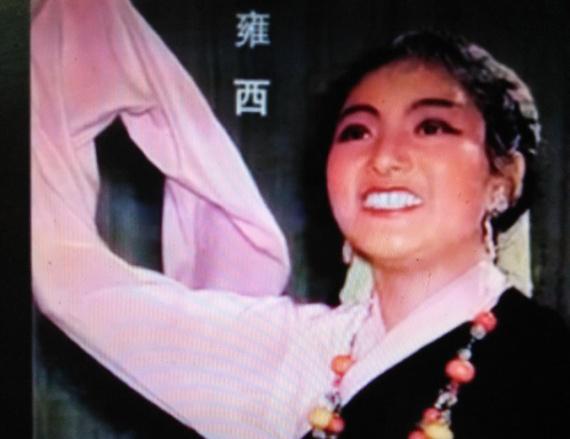In November 1964, the National Amateur Art Observation and Performance Meeting of ethnic minorities was held in Beijing. As a Representative of the Tibetan Nationality, Yongxi, an 18-year-old seamstress, brought the song "On the Golden Mountain of Beijing" to Beijing for the first time. During the performance, Chairman Mao sat down on the stage, and Yongxi could not hide his inner excitement. With full of sincerity and a loud voice, she dedicated this song to Chairman Mao.

Later, in order to show the new achievements of the art of all ethnic groups in the motherland in the new period, the Central People's Radio went to Tibet to record Tibetan songs. This time, in order to more directly express the Tibetan people's love for Chairman Mao and the party, the author Ma Zhuo directly changed the first two sentences to the original: "The golden mountain in Beijing shines in all directions, and Chairman Mao is the golden sun." In this way, the theme is clearer and the feelings are more straightforward. And this time, the singer has changed again. Who is she? She is the famous soprano Tseten Dolma.
Tseten Dolma, born in 1937, studied in the Vocal Music Department of the Shanghai Conservatory of Music at the end of 1958. After graduating in 1964, Tseten Dolma successively served as an actor and leader of the Tibet Autonomous Region Song and Dance Troupe, and the chairman of the Tibet Federation of Literary and Art Circles. The main songs she sang were "Turning Over the Serfs to Sing", "Singing Mountain Songs to the Party", "Wine Songs", "We Get Together Again" and so on. Moreover, she has also participated in the performance of the large-scale musical and dance epic "Oriental Red".
Tsetan Dolma starred in "Oriental Red"
When the Central People's Radio went to Tibet to record songs, she was already a well-known singer in the local Tibetan area. Therefore, the radio staff suggested that she record the song. When Tsetan Dolma received the invitation, he was also overjoyed. In fact, as early as 1964, when the National Ethnic Minority Literature and Art Festival was held, Tseten Dolma fell in love with this song "Beijing's Golden Mountain". At that time, she was rehearsing the large-scale musical and dance epic drama "Dongfang Hong" in Beijing, and just happened to hear Yongxi's singing on the stage of the show, and she felt that this was a rare and good song.
This is a complete song score with two lyrics. Because Tseten Dolma herself was born as a serf in Tibetan areas, she and her family lived a miserable life before the peaceful liberation of Tibet. She feels more empathy for this song. With the sensitivity of the artist, she feels that the lyrics of the original paragraph are not complete and rich enough, and she always feels that the expression is not in place enough, and the feelings are not strong enough. After much thought, she suggested that Ma Zhuo add another lyric. Therefore, Ma Zhuo filled in the second paragraph on the basis of the first lyrics, which became what it is today.
"The golden mountains of Beijing shine in all directions, and Mao Zedong Thought nurtures us to grow, turn around and serfs with high morale, and build a socialist new Tibet." The hymns are dedicated to Chairman Mao, and the hymns are dedicated to the Communist Party of China. Hey Bazaar Hey! ”
The short and simple language most directly expresses the incomparable love of millions of turned serfs for Chairman Mao and the party, and the melody of the song is concise and clear, and it is catchy. With his unique clear voice and simple and sincere emotions, Tsetan Dolma perfectly interpreted this song "On the Golden Mountain of Beijing". After the recording was completed, this song was broadcast to the whole country by the Central People's Radio, and soon spread throughout the motherland, causing great repercussions. To this day, it is still the representative and symbol of Tibetan music.
This is the Chinese and Tibetan bilingual song score of "On the Golden Mountain of Beijing". Tsetan Dolma's version of "On the Golden Mountain of Beijing" is first sung in Chinese, and then sung again in Tibetan, with a loop of back and forth, which is unique. The well-known phrase "Bazaar Hey" at the end of the song is actually the Tibetan word, "Thank you".
It is said that when this song was widely sung in the 1970s, the Han audience followed the singer's Tibetan language, marked the Tibetan pronunciation on the lyrics, and learned to sing word by word, just like today people mark the phonetic alphabet to learn English. Fans enjoyed it and were proud to sing a few Tibetan songs. This also shows the popularity of this song at that time.
Over the years, the reason why this song has been popular is that it actually has a profound historical and contemporary background. Before the democratic reforms of 1959, Tibet was for a long time in a feudal serfdom society under the dictatorship of monks and aristocrats. Tibet's democratic reform has abolished the decadent and dark serfdom, and millions of serfs have been liberated, from backwardness to progress, from darkness to light. The sincere gratitude of the serfs to the Party and Chairman Mao can be fully expressed only through such chanting. This melody, this lyric, is like a clear spring flowing from the heart, sincere, natural, and cheerful.
Pay attention to the headline number of "Hubei Satellite TV Big Reveal" to decrypt more wonderful stories for you!